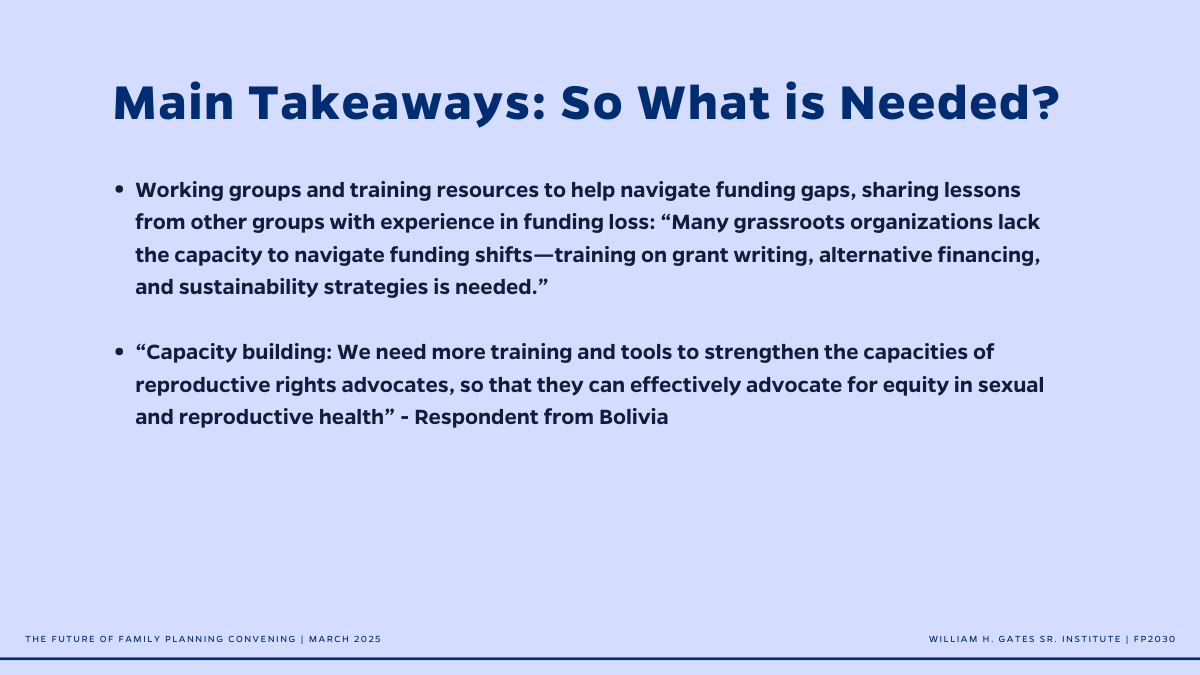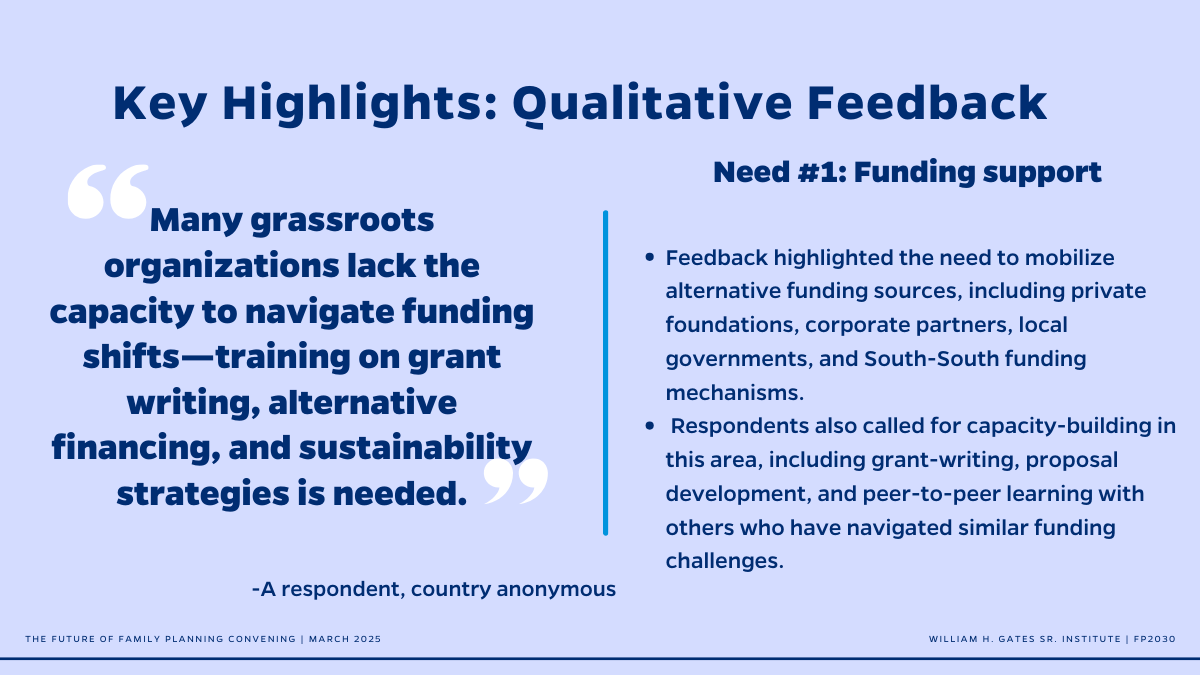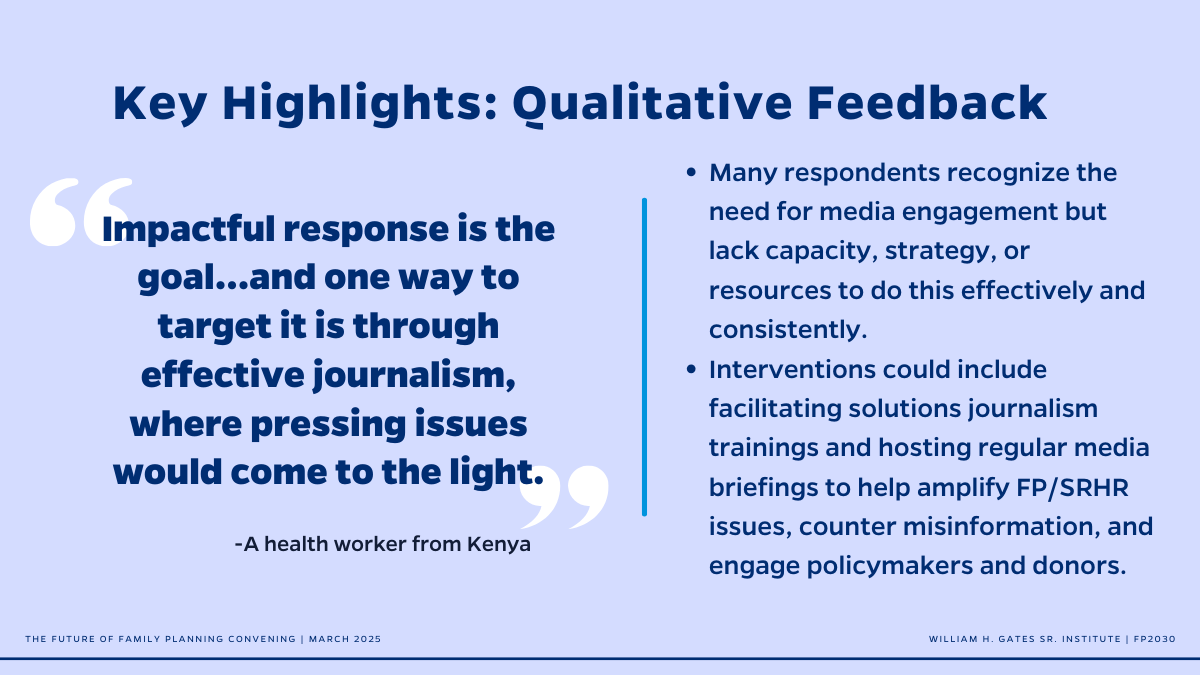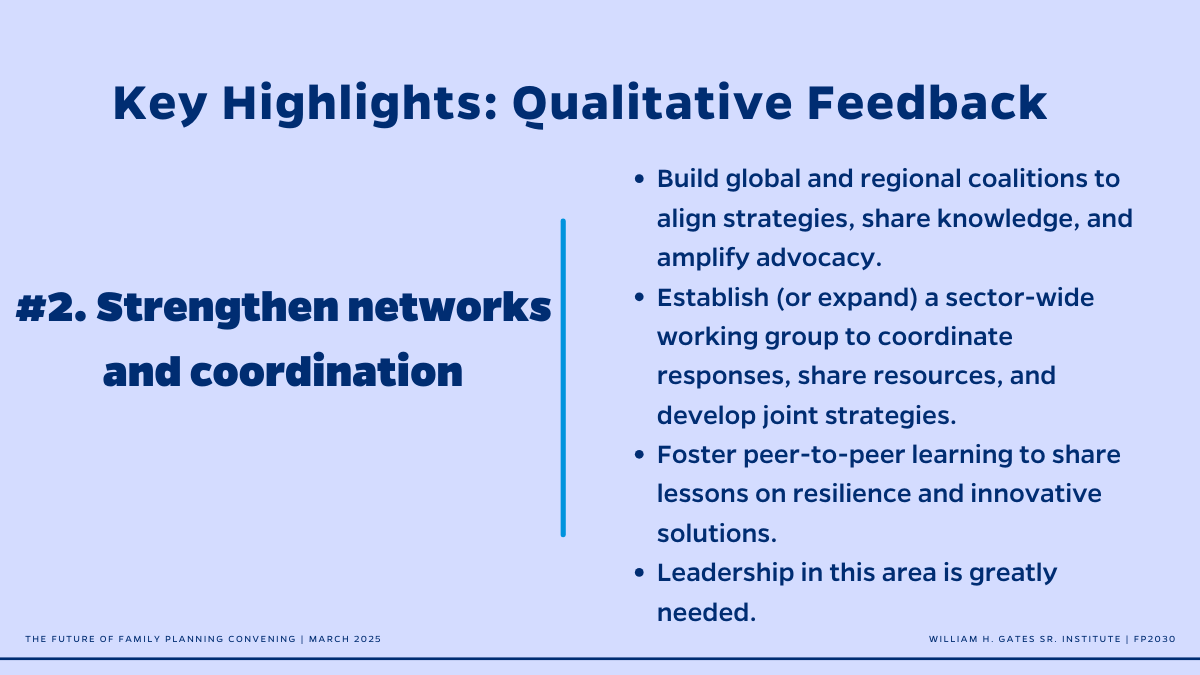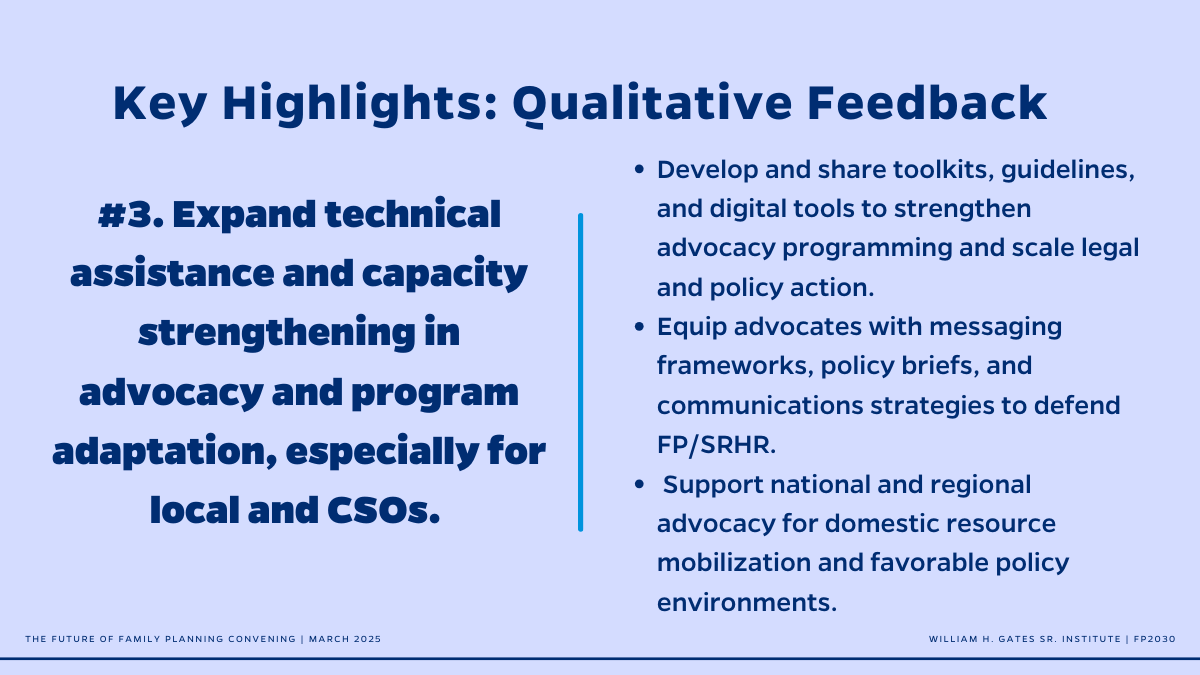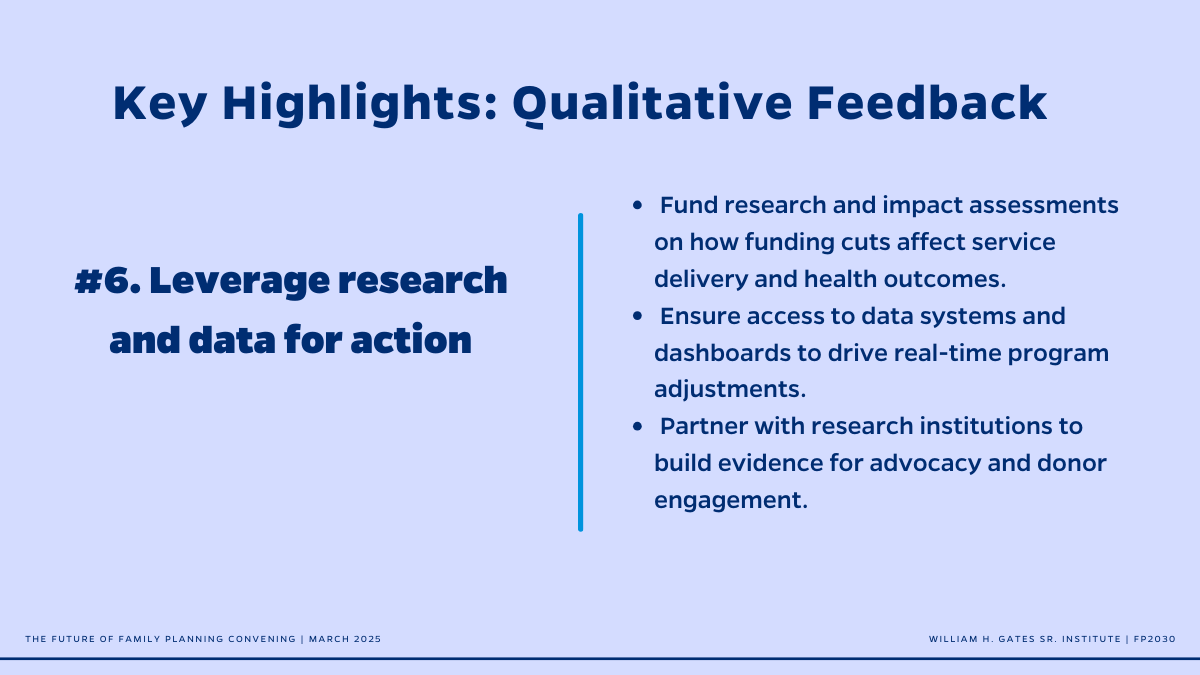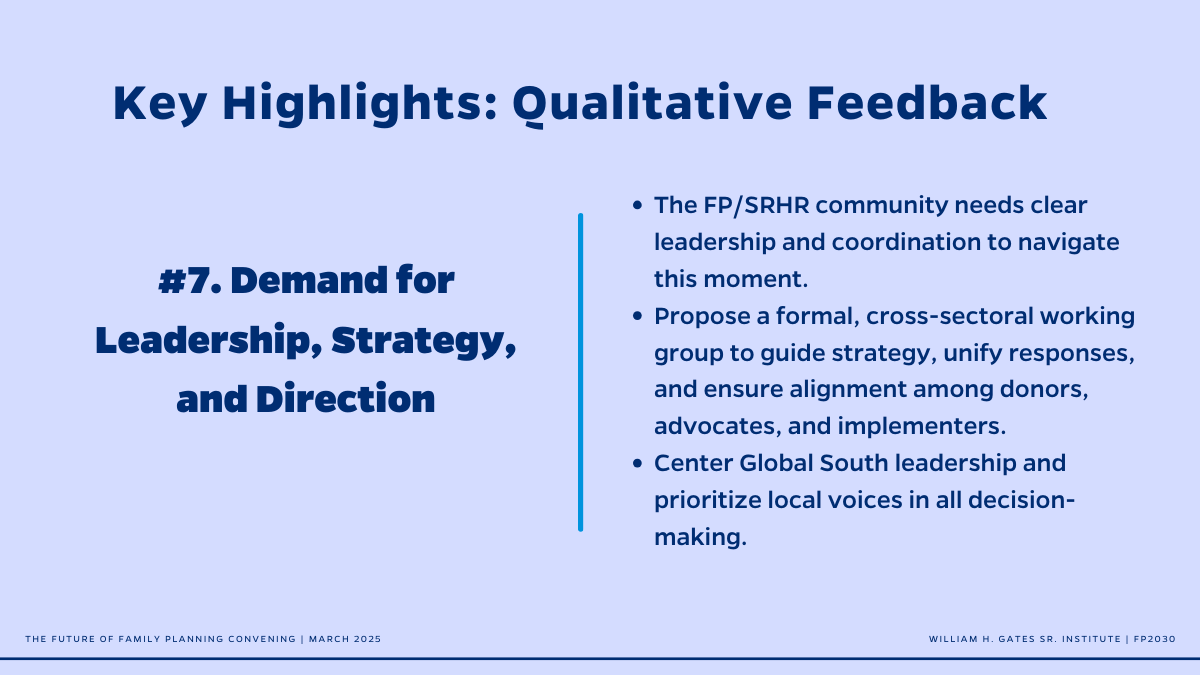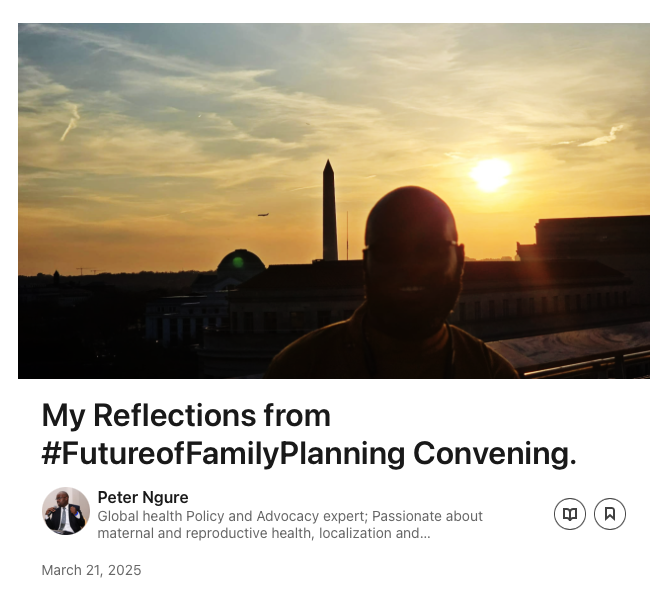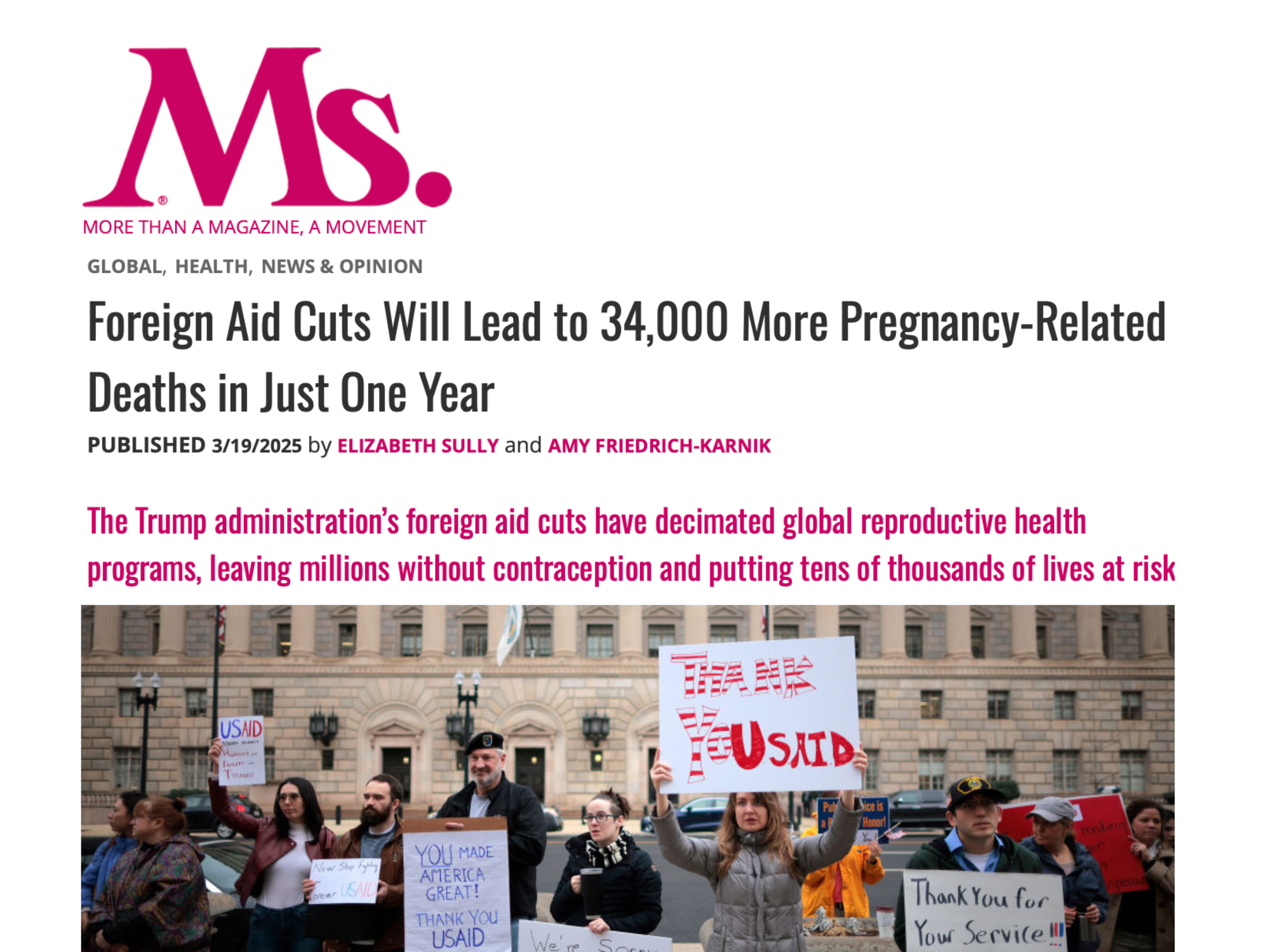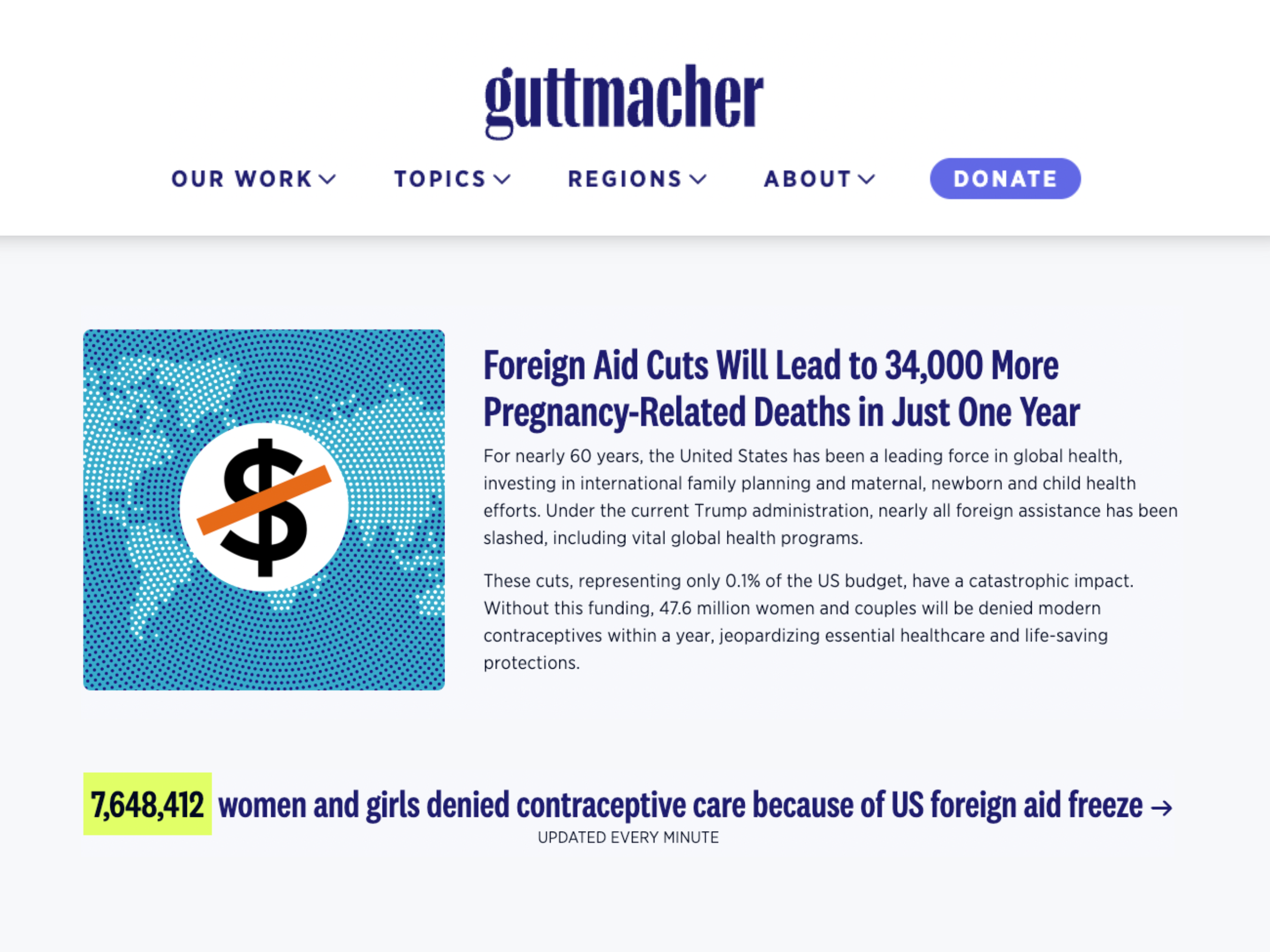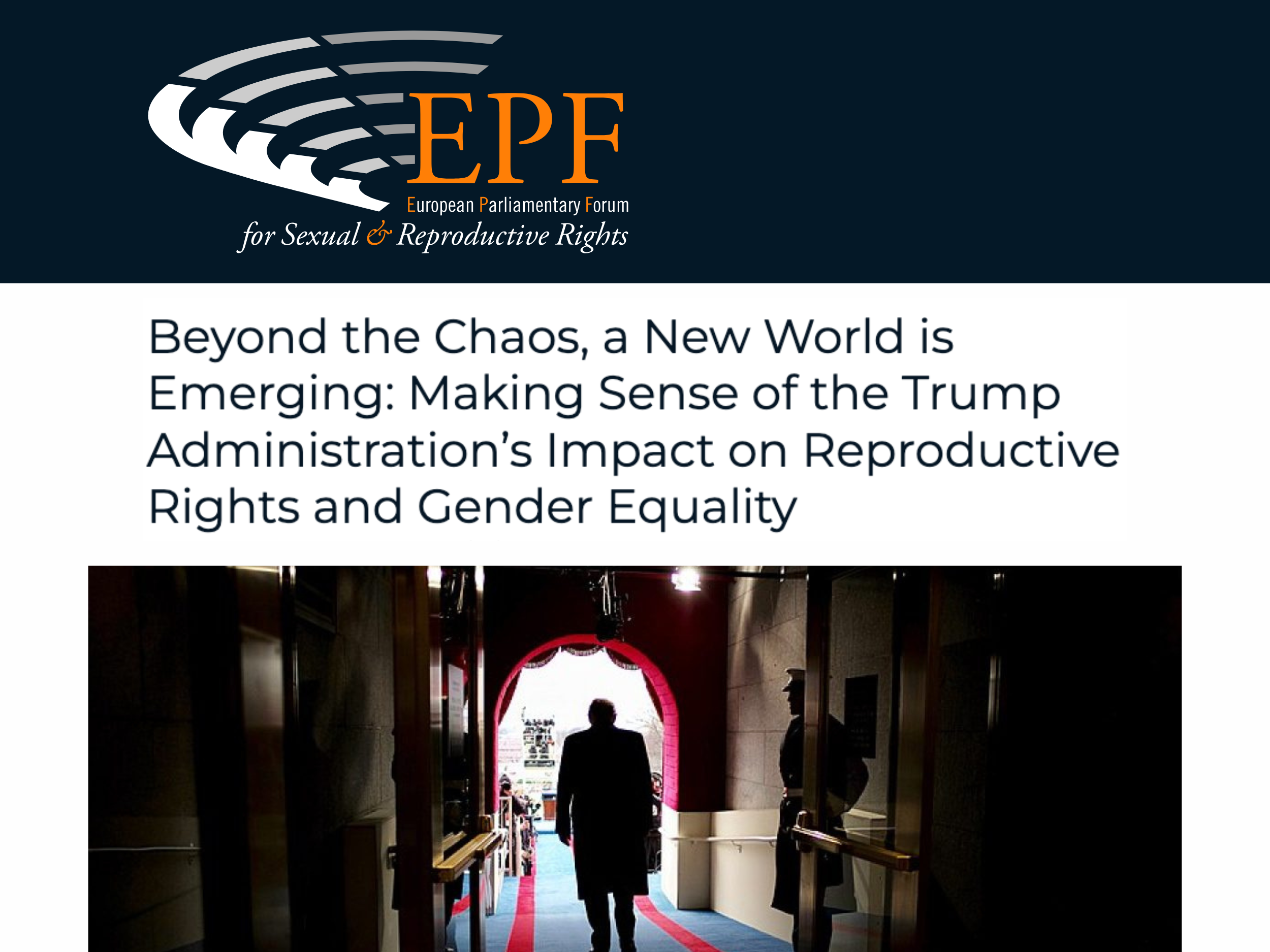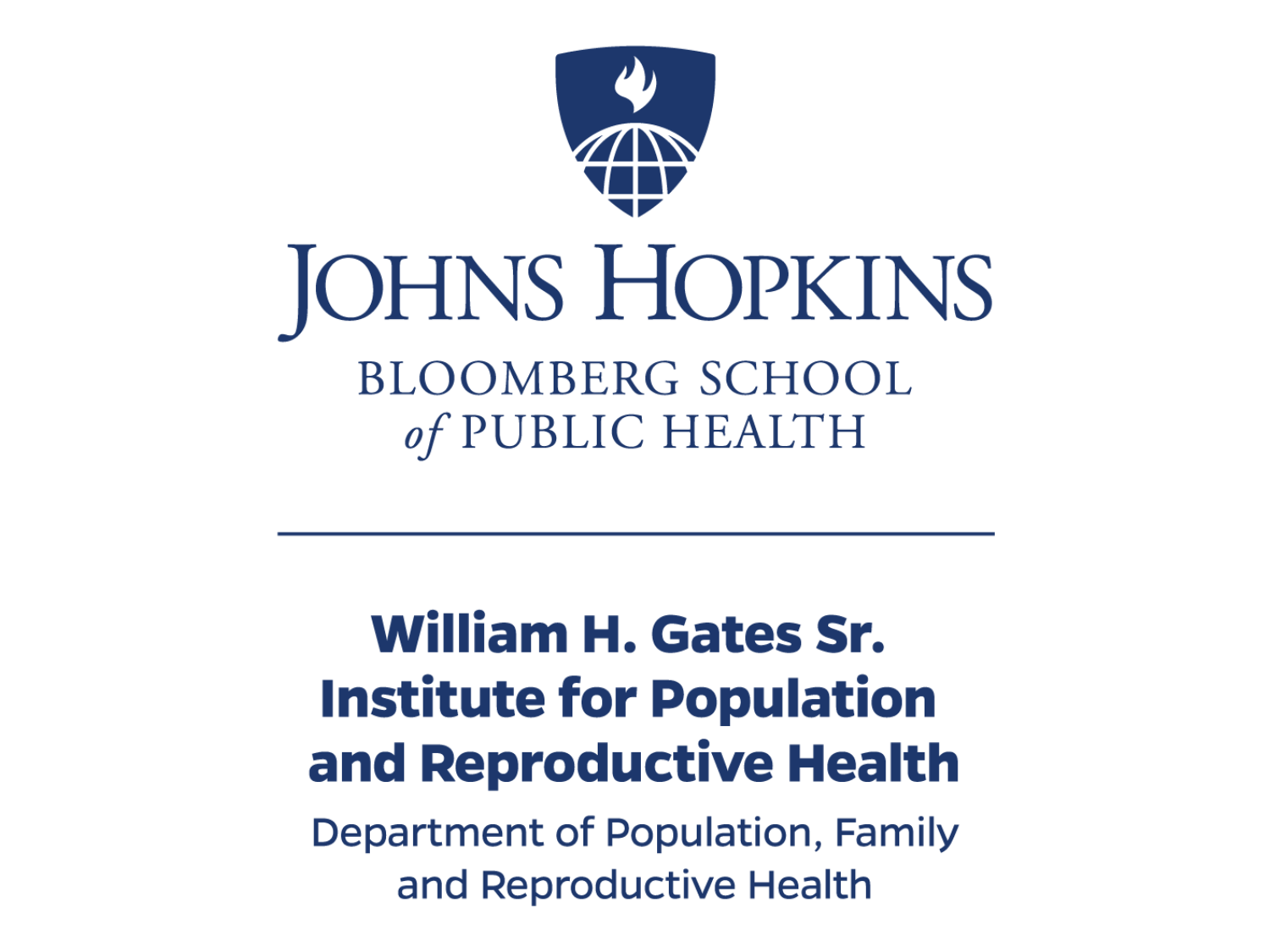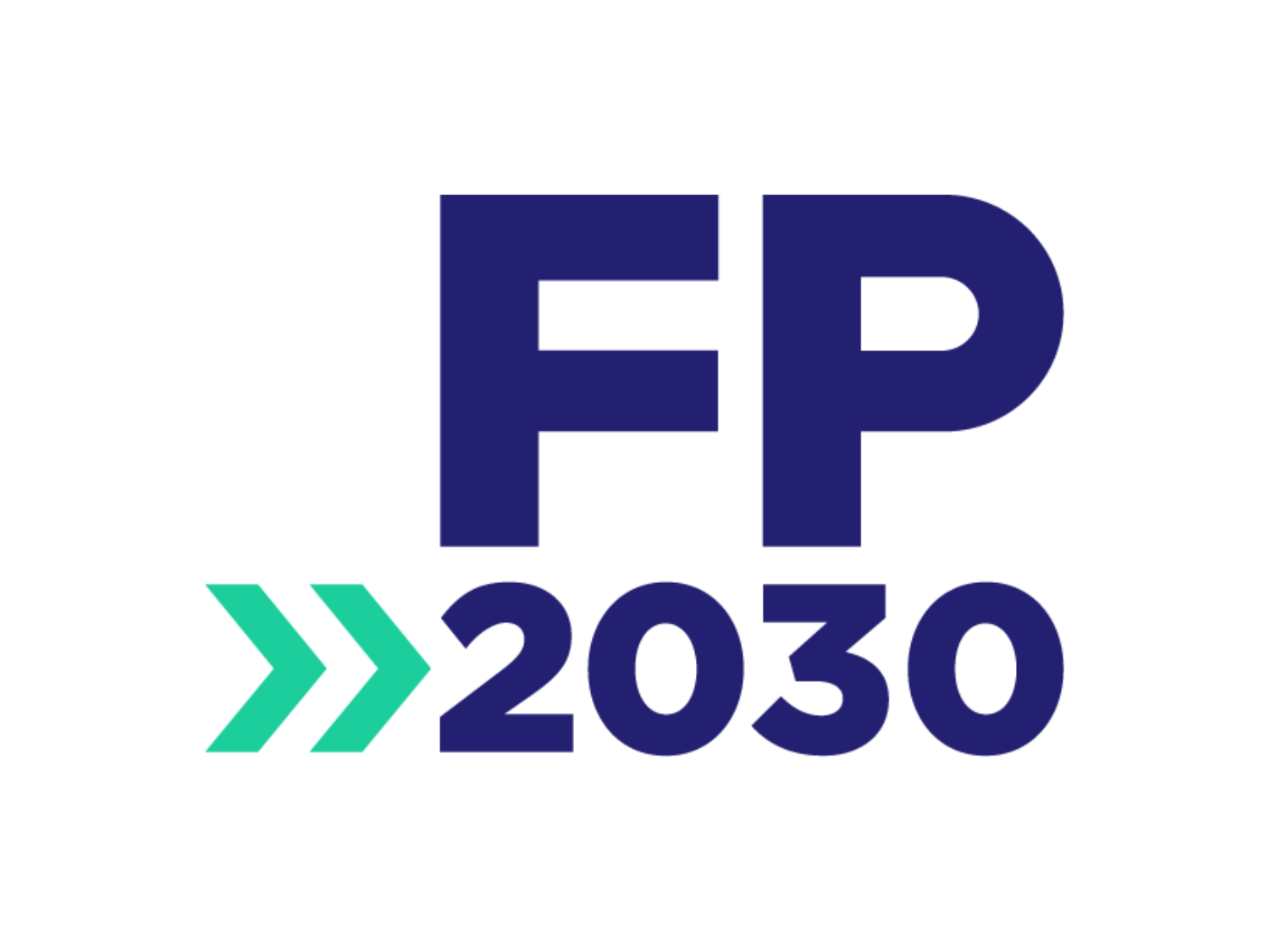A Unified Global Call for Equity and Innovation
Building bold, collaborative solutions for reproductive health in a rapidly shifting global landscape

Future of Family Planning Convening
In March 2025, the Future of Family Planning (FFP) Convening brought together over 200 diverse global leaders, researchers, and advocates to strengthen evidence-based action, drive advocacy, and align priorities for advancing family planning (FP) and sexual and reproductive health and rights (SRHR).
The convening occurred at a critical moment for global health, with shifting political landscapes, evolving donor priorities, and heightened urgency to address health inequities.
Meeting the Moment
Dr. Philip Anglewicz,
Director, William H. Gates Sr. Institute for Population and Reproductive Health
Remarks from Convening Organizers
Jump to Convening Highlights
- Introduction & Opening Remarks
- Keynotes & Featured Videos
- Overall Takeaways
- The Data That Drives Action
- Priorities for Action
- Advocacy Session Highlights
- Community Needs Assessment Results
- Made Possible by Family Planning
- Family Planning News Network
- Advocate Spotlight
- Moving Forward to ICFP 2025
- Related Media
- Multimedia Gallery
Convening Keynotes and Featured Videos
The Future of Family Planning
Dr. Natalia Kanem,
Executive Director, UNFPA
Family Planning 30 Years after ICPD
Esenam Amuzu,
SRHR Champion; FPNN Community Reporter
The Urgency of Now
Dr. Tlaleng Mofokeng,
United Nations Special Rapporteur on the Right to Health
We Are Stronger Together
Dr. Samukeliso Dube,
Executive Director, FP2030
Data that Drives Action
View the evidence presented at the convening—how funding shifts, policy changes, and advocacy strategies are shaping the future of family planning.
1. 70% of Donor Funding for Family Planning Is at Risk
The U.S. government historically contributed $600+ million annually, making up ~40% of total donor funding for family planning. Combined with significant cuts from the UK and the Netherlands, an estimated 70% of FP donor funding is now either gone or at risk.
→ This represents a massive financial gap threatening global contraceptive access.
2. U.S. Funding Supported Over 47 Million People Annually
In FY2024, U.S. family planning funding:
• Served 47+ million women and couples
• Averted 17.1 million unintended pregnancies
• Prevented 5.2 million unsafe abortions
• Saved 34,000 women from preventable maternal deaths
→ Losing this funding could reverse decades of global health progress.
3. $127 Million Needed to Maintain FP Commodity Stock Levels in 15 Key Countries
Based on data from Reproductive Health Supplies Coalition:
• $127M is needed to maintain the status quo of FP commodity procurement in top-need countries.
• If pending USAID funds do not materialize, the commodity funding gap could grow by $33M (13%).
→ Critical contraceptive stock levels are already under threat in countries like Ethiopia, Nigeria, and Uganda.
Data courtesy of USAIDStopWork.com
Data and Presentations Overview
We have synthesized the highlights from each working session.
Click the headers to learn about each.
- The loss of U.S. funding is severe but not unprecedented; adaptation and advocacy are key.
- Core values—equity, autonomy, self-determination—must guide responses.
- FP was not deemed a “lifesaving” service, leading to deep funding cuts.
- U.S. funding withdrawal exacerbates global FP financing gaps.
- FP divestment undermines international solidarity and global health commitments.
- Courts ruled that U.S. funding commitments before Feb. 13 must be honored, but enforcement is unclear.
- The urgency of creative solutions—locally led projects, new data collection, and advocacy efforts.
Key next steps: Align methodologies for cohesive data storytelling to amplify FP needs before and during ICFP.
- Many African countries made progress on modern contraceptive prevalence rate (mCPR) and unmet need, but face reversals due to funding losses.
- The withdrawal of U.S. funding will lead to increased maternal mortality and adolescent pregnancies.
- Vulnerable populations will bear the most significant impact.
- FP services in humanitarian settings face severe challenges.
- The closure of the Demographic and Health Surveys (DHS) Program disrupts FP data collection.
- Countries explore alternative funding through domestic mobilization, public-private partnerships (PPPs), and philanthropic engagement.
- The government and/or civil society representatives on the panel (from Ethiopia, Kenya, Nigeria, and the nine Ouagadougou Partnership (OP) countries) have begun to assess and mitigate funding gaps.
Calls to action:
- Urgent advocacy is needed to re-engage donors and influence domestic policies.
- Efforts must prioritize equity, integration of FP into other national programs, and leveraging grassroots efforts. Urge governments to recognize FP as an economic and development priority.
- FP is part of a disrupted global ecosystem; solutions must be systemic.FP programs were excluded from “lifesaving” exemptions, leading to severe service disruptions.
- Supply chains are facing critical unpredictability, jeopardizing FP commodity access.
- U.S. withdrawal from SRHR leadership results in gaps in global guidelines and technical expertise.
- Anti-FP policies are gaining ground, fueled by misinformation and political agendas.
- Urgent need for diversified supply chain strategies and regional procurement models.
- U.S. opposition to FP threatens funding and the global governance structure.
Calls to action:
- Identify new donors, strengthen partnerships, and build localized solutions.
- Build proactive counter-narratives against anti-gender policies and misinformation.
- Countries should integrate FP into broader economic and social frameworks to sustain support.
- Private-sector engagement is necessary to support contraceptive procurement and distribution.
- Equity must be central to FP policy, programs, and funding decisions.
- USAID funding withdrawal affects workforce, service delivery, and monitoring.
- Loss of USAID’s global knowledge hub threatens access to FP data and research.
- Social behavior change (SBC) approaches are crucial in countering misinformation and sustaining demand.
- Strategic advocacy must highlight FP’s return on investment to governments and donors.
- Need for alternative financing models, including social entrepreneurship and private-sector engagement.
- Solutions: Technical assistance for small, local organizations to mobilize funding, including grant-writing training. Use solutions journalism to engage media and spotlight issues.
Calls to action: Establish a global FP knowledge hub, integrate FP into universal health coverage, and engage more non-traditional partners (corporate philanthropies, local governments, and impact investors).
Breakout Sessions:
Identifying Priorities for Action
We have synthesized the highlights from each working session.
Open the toggles to learn about the priorities.
Government/Domestic Financing
- Out of the box financing with: Private sector incentives, blended financing, sin taxes, and local philanthropists.
- Advocacy with national governments with community and subnational accountability
- Having an equity lens, i.e., unmarried women, PLHIV, sex workers, youth, males, refugees, and displaced people.
Program Service Delivery
- Identifying successful models for integration, e.g STI, HIV, MNH, and disseminating the same to health actors
- AI and digital tools can optimize supply chain management and prevent stockouts.
- Integration of FP/SRHR into other health programs ensures sustainability and efficiency.
Social and Behavioral Change (SBC)
- Creating a consolidated hub to host critical global health goods to support the development and implementation of new programs
- Expanding digital and social media strategies, integrating FP advocacy into mainstream discourse, and ensuring linguistic equity in messaging.
- Transfer Knowledge and materials to local organizations so work continues amidst the USAID stop work order.
Commodity Financing
- Governments need better cost data to inform FP financing decisions.
- Country compacts should evolve into business-driven accountability models.
- Sustainable financing strategies, regulatory policy reforms, and local production of contraceptives.
- Subsidies for FP commodities must be targeted and disciplined.
Data and Research
- Advocacy is needed to ensure global public goods in FP data remain accessible.
- Identify a minimum set of indicators that should be collected with strengthened national data management capacities.
- Developing new survey methodologies, preserving historical data, and integrating FP indicators into broader health tracking systems.
Communications and Media
- Go local, Go mobile, Go direct
- Turn stories into actionable advocacy
- Coordinate, connect, and stop duplication
Policy & Advocacy
- Develop SRHR messaging that aligns with other feminist foreign policy movements, such as those linked to climate justice
- Develop counter-narratives to combat “anti-gender” initiatives and policy rollbacks
- Neutral space for cross-sectional alliance building
Financing: Donor Perspectives
- Accelerating domestic resource mobilization through enabling PPP and developing ROI metrics to drive investments.
- Investing in Global public goods by funding contraceptive research, development and innovation, strengthening data systems and supply chains as well as scaling high impact reproductive health practices
- Support civil society engagement by supporting advocacy, funding local platforms for rapid response, and promoting knowledge sharing.
Financing: Private Sector
- Manufacturers to co-create solution to reach consumers
- Have supply chain innovation
- Redirect demand from public to private
Advocacy Session Highlights
At a pivotal moment for global family planning, the Advocacy Session at the Future of Family Planning Convening sparked bold conversations about how the FP community can adapt, evolve, and lead.
A Pivotal Moment for FP Advocacy
With shifting donor priorities, growing anti-rights sentiment, and changes in funding landscapes, the FP community must reflect and evolve. This session explored urgent advocacy opportunities and surfaced strategies for a resilient, inclusive, and impactful movement.
- How do we do advocacy differently to meet the moment?
- What are the immediate advocacy priorities?
- Who are the new key players across sectors?
Priority #1 – Mobilizing Sustainable and Innovative Financing
- Advocate for domestic resource mobilization with clear financial roadmaps.
- Engage parliamentarians and develop public-private partnerships.
- Reframe FP/SRHR as an economic and development imperative.
- Push for FP visibility in global economic forums.
💡 Proposed Actions:
- Support financial roadmap development at the country level.
- Build new funding streams via sin taxes, blended finance, etc.
- Elevate the investment case for FP/SRHR globally.
Priority #2 – Countering Anti-Rights Narratives and Policies
- Push back against harmful frameworks like the Geneva Consensus Declaration.
- Center media and grassroots voices to counter disinformation.
- Drive citizen demand and resist transactional aid threats.
💡 Proposed Actions
- Publish and promote an advocacy report challenging restrictive narratives.
- Mobilize media to amplify positive FP messaging.
- Empower grassroots and interfaith movements.
Priority #3 – Broadening and Strengthening Multi-Sectoral Coalitions
- Collaborate beyond traditional allies: think economic, climate, and industry sectors.
- Integrate FP/SRHR with other key issues: HIV, TB, gender equity, and climate change.
- Strengthen inclusivity in advocacy approaches.
Priority #4 – Strengthening Supply Chains and Ensuring Commodity Security
- Highlight and address FP/RH commodity shortages.
- Push for diverse and sustainable financing.
- Use digital tools to monitor stockouts and drive accountability.
💡 Proposed Actions
- Promote supply chain transparency.
- Advocate for more substantial public sector logistics.
- Drive investment in digital tracking platforms.
Community Needs Assessment:
Gathering Insights to Drive Change
Would you like to contribute additional insights or content for the needs assessment? For information on the Future of Family Planning Convening, please get in touch with napcar1@jh.edu.

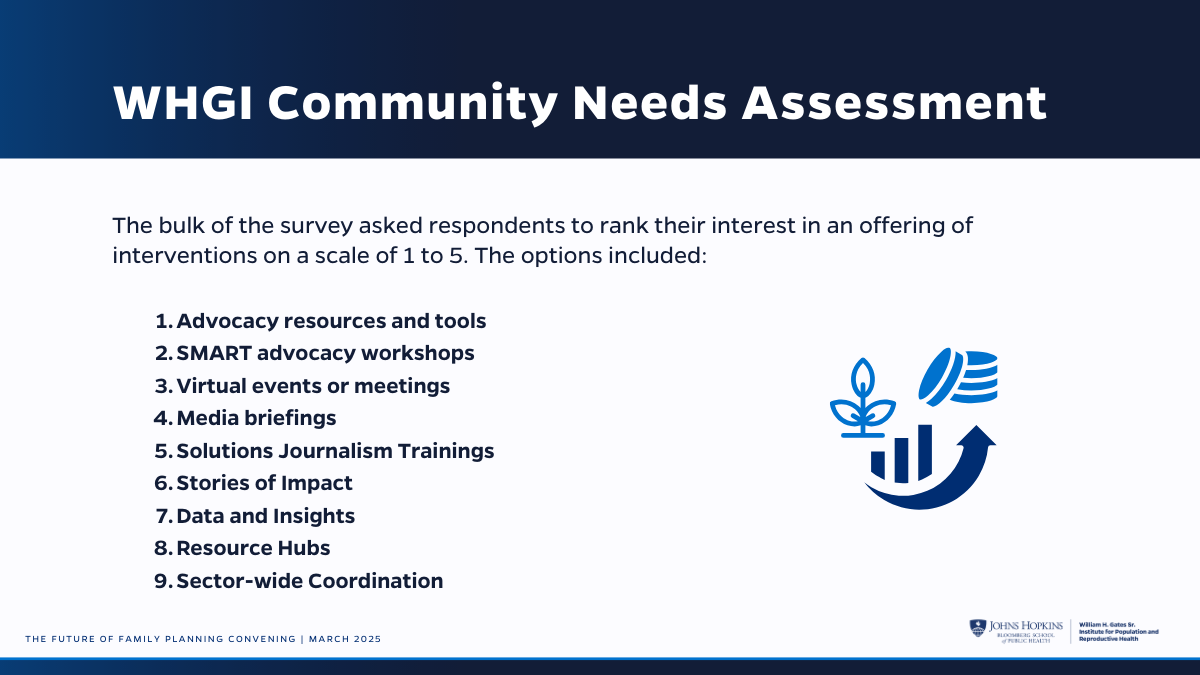
The William H. Gates Sr. Institute (WHGI) Community Needs Assessment was conducted to ensure that the global response to foreign assistance cuts and political rollback of SRHR is grounded in the lived realities of our community.
From February to March 2025, the survey gathered 377 responses from 58 countries, capturing diverse perspectives across all regions.
Qualitative Feedback Highlights
Made Possible by Family Planning
Healthy Families, Thriving Communities, Unlocked Dreams
Be a part of FP2030’s global campaign to raise new money, galvanize new leadership, and spark new momentum for rights-based family planning.
Help ignite new momentum for family planning by taking part in FP2030’s Made Possible by Family Planning campaign! This ongoing global initiative highlights powerful personal stories, showcasing how access to family planning has transformed lives.
Get Involved
Here’s how you and/or your organization can participate:
✔ Record a short video sharing how family planning has helped you achieve your dreams.
✔ Use the hashtag #MadePossibleByFP and post your video on Instagram and X to join the conversation.
✔ Access the digital toolkit for campaign logos, social media images, and resources to amplify your message.
Together, we can impact how those outside our community view and make decisions about family planning.
Watch #MadePossibleByFP Stories on FP2030’s Instagram:
Family Planning News Network:
Amplifying Voices for Change
Connecting Stories, Advocacy, and Impact
The Family Planning News Network (FPNN) continues to elevate the voices of advocates, journalists, and community leaders committed to advancing family planning and reproductive health. As part of the Convening, FPNN is helping to shape the global narrative and build momentum toward #ICFP2025 in Bogotá.
Key Highlights:
Powerful Storytelling
Journalist Louisa Fernanda Orozco Valencia’s article in El Espectador draws attention to urgent global reproductive health issues and highlights their potential impact on Colombia.
Visual Advocacy
A compelling video by Esenam Amuzu showcases community-driven solutions and messages of hope aligned with ICPD principles.
Community Leadership
Looking Ahead
FPNN is organizing a strategic reporting trip to amplify voices and coverage leading into ICFP 2025, strengthening the narrative of resilience and innovation within the global family planning movement.
📢 Stay tuned for more stories and impactful Family Planning News Network reporting.
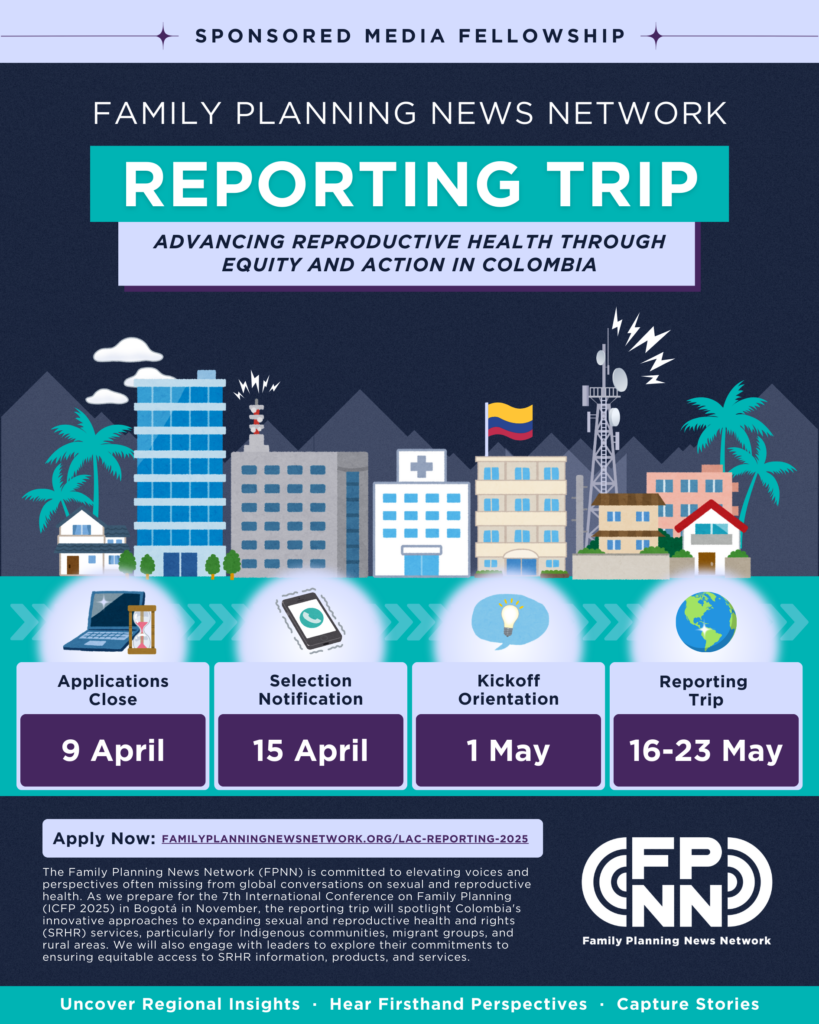
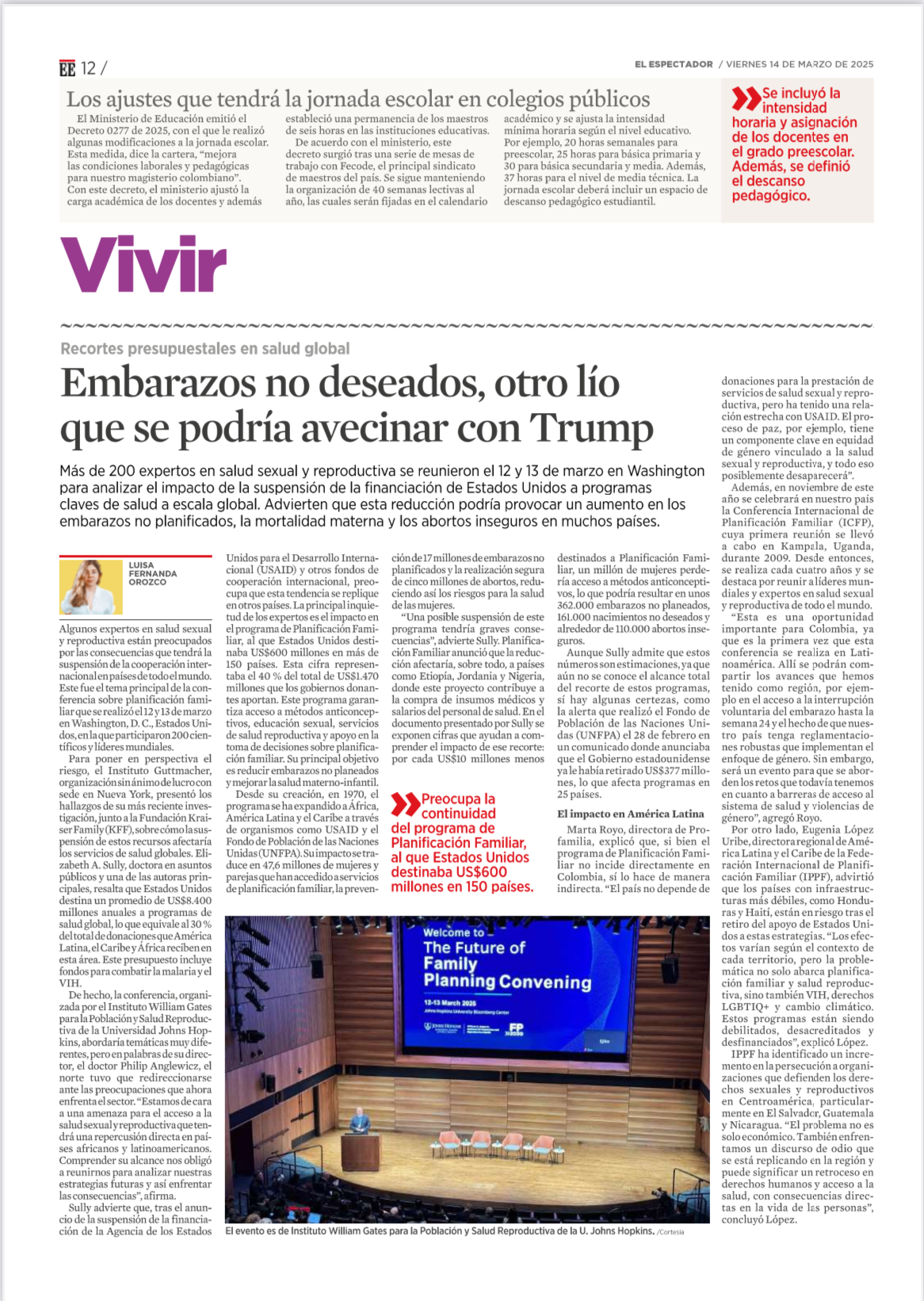
Advocate Spotlight: Peter Ngure
“My Reflections from the #FutureofFamilyPlanning Convening”
Peter Ngure, a global health policy and advocacy expert and Founder of Pathways Policy Institute (PPI), shares powerful insights from his experience as an advocate and ICFP 2025 Advocacy & Accountability Subcommittee co-chair at the Future of Family Planning Convening.
Peter reflects on the urgency of building hope and resilience for the future of family planning, even amid challenges like budget cuts and program terminations. His call to action highlights the importance of engaging political leaders, broadening coalitions, shaping media narratives, and advancing grassroots advocacy.
As he passionately states,
“The convening was a start of a ‘we are not done’ movement…The challenge is here with us; we accept and are ready for it!”
International Conference on Family Planning
Shaping the Future of Family Planning Together
As we look ahead to the International Conference on Family Planning (ICFP 2025) taking place 3-6 November 2025 in Bogotá, Colombia, the energy and insights from the Future of Family Planning Convening are driving us forward.
Get Involved in #ICFP2025
Submit an Abstract
We want to hear your innovative research, experiences, and solutions. Help shape the agenda for ICFP 2025. Submit an abstract in English, French, and/or Spanish by 19 April 2025.
Review Abstracts
Sign up to review ICFP 2025 abstract submissions in English, French, or Spanish by 7 April 2025.
Join a Subcommittee
Participate in any one of ICFP’s 11 vibrant subcommittees dedicated to planning and delivering a powerful conference experience to help drive the program forward.
Related Media
Multimedia Gallery
View select photos from the Future of Family Planning Convening below.




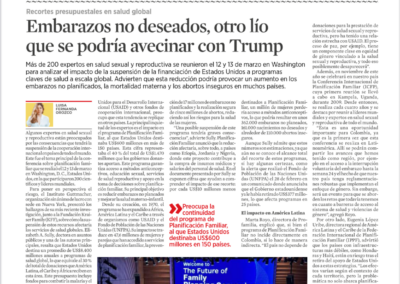
Future of Family Planning Convening Organizers
For information related to the Future of Family Planning Convening, please contact GatesInstitute@jh.edu.
A special thanks to our facilitator, Sarah Nehrling, whose thoughtful approach to facilitation and session design helped shape such an engaging and productive experience. From structuring groupwork to guiding conversations in the moment, her efforts were invaluable in making this event a success. You can learn more about her work at Garabam Consulting.









